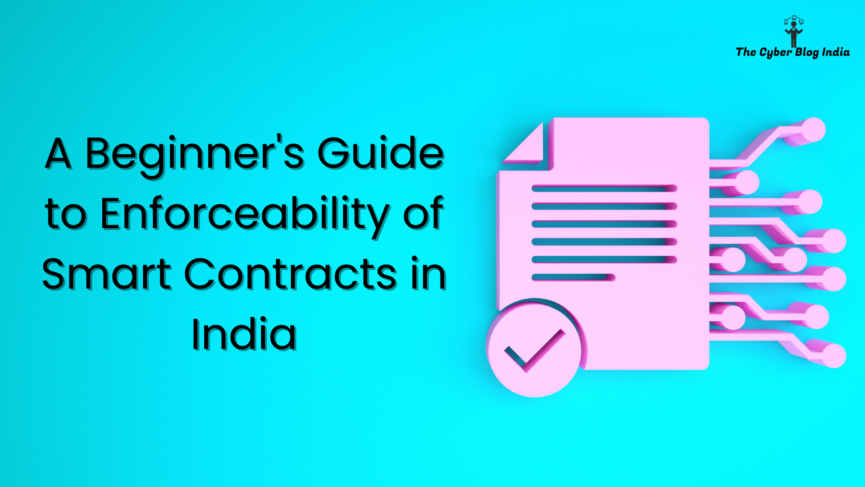A Beginner’s Guide to Enforceability of Smart Contracts in India

The development of generative AI and blockchain technology has questioned our understanding of technology and its implications for legal affairs. One such area is smart contracts, which has emerged with misconceptions and uncertainties. Smart contracts in India are viewed with mistrust and hesitation due to their technical nature and the legal vacuum surrounding them. To fill this vacuum, one must understand what smart contracts are and the perks they offer over traditional contracts.
What are Smart Contracts?
Imagine a contract acting like a self-driving car, automatically navigating its legal obligations based on predetermined conditions. Such contracts eliminate the need for human intervention and human error. This is the essence of a smart contract, a contract based upon self-executing codes stored using blockchain technology. Nick Szabo proposed smart contracts for the very first time in 1994. Today, they have gained significant traction due to the widespread popularity of blockchain technology. Leading banks such as SBI, ICICI, Axis Bank, and HDFC Bank, among others, have already formed a consortium to implement smart contracts in banking operations.
For smart contracts, blockchain technology is the backbone. According to Zheng, “a blockchain is a continuously growing chain of blocks. When a new block is generated, all the nodes in the network will participate in validating the block. Once the block is validated, it will be appended to the blockchain.” To explain this with an example, imagine you have a notebook where you write down a list of transactions. Instead of just having a single copy of the notebook, there are many copies of this notebook. All these copies are connected to a network. When someone wants to add a new transaction to the notebook, everyone in the network has to validate this transaction. Once they agree, the transaction gets added to the notebook as a new page. This new page is linked to the previous page, forming a chain of transactions.
Interpreting Indian Contract Law for Smart Contracts
The Indian Contract Act, 1872 (“Contract Act”) states that all agreements are contracts if they are made by the free consent of the parties competent to contract, for a lawful consideration and with a lawful object, and are not hereby expressly declared to be void. The Contract Act does not explicitly mention smart contracts as invalid or unenforceable. However, Section 10A of the Information Technology Act, 2000 (“IT Act”) grants legal validity to contracts formed through electronic means.
If we consider smart contracts under Section 10A, it will require competent parties to enter into smart contracts, have legal objects, and have lawful consideration. Such contracts will be enforceable in India. Both parties could mutually decide the preconditions for the self-executable contract code. The object of the contract could include any valid objective, such as warehouse management. A possible consideration here is the monthly service fee payment to the warehouse management service provider.
For this interpretation to hold true, there are a couple of considerations. For contracts formed through electronic means, they will feature the electronic signatures of both parties. Section 2(1)(ta) of the IT Act defines electronic signature. At present, the IT Act and relevant rules issued thereunder recognise two types of electronic signatures:
- Public Key Infrastructure (PKI) based digital signatures
- Authentication via Aadhaar number and one-time password (OTP)
Can we create a mechanism for smart contracts that relies on these two types of electronic signatures? Or can the Central Government use its powers under Section 10 of the IT Act to define a new type of electronic signature for smart contracts? We need to seek answers to these questions.
Other Important Considerations
The emergence of cryptocurrency as a consideration for smart contracts has created a sense of insecurity between the parties due to a lack of a well-defined legal framework. Smart contracts rely on cryptocurrencies for consideration, allowing them to function without human intervention and instantly transfer the consideration to the other party.
The development of a legal position on cryptocurrencies has been a matter of debate in India. On April 06, 2017, the Reserve Bank of India (RBI) issued a circular prohibiting financial institutions from dealing in cryptocurrencies or providing related services. However, the Supreme Court quashed this circular and found the prohibition disproportionate. Later, in 2022, the government classified cryptocurrencies as taxable assets by imposing a 30% tax on profits made on cryptocurrency transactions. It is only a matter of time before we start considering cryptocurrencies as a lawful consideration. In 2021, the Ministry of Electronics and Information Technology (MEITY) also published the National Strategy on Blockchain, illustrating blockchain-based initiatives for the Internet of Things (IoT) and healthcare services, among other industry sectors.
Conclusion
Have you ever wondered what the future holds for us? Smart contracts powered by blockchain technology are one possibility. These contacts are not only efficient but also transparent and immutable. But wait, there is more. To ensure a brighter future, it is crucial to establish regulations for smart contracts and enact laws addressing blockchain technology and virtual currencies. After all, technology has been the defining element of this century and leaving it unregulated could lead to unimaginable pitfalls. The urgency and necessity of legal frameworks for the future of smart contacts should not be underestimated.
